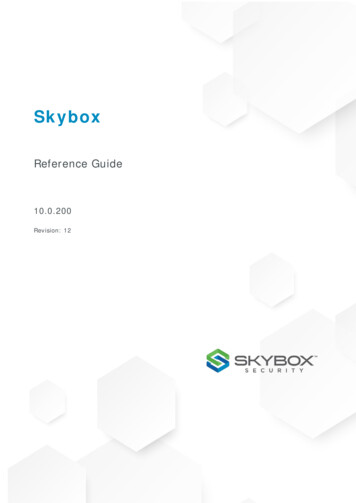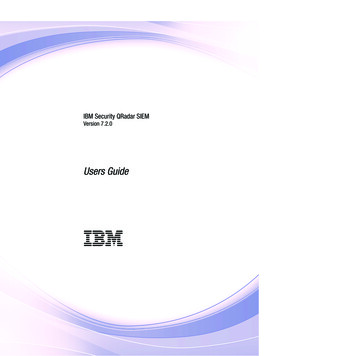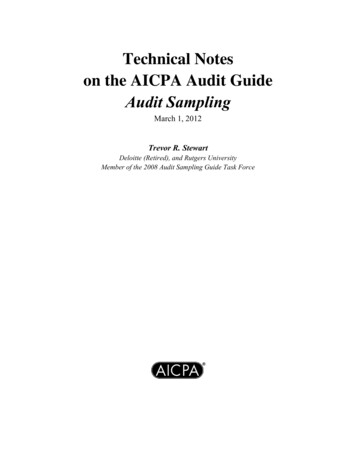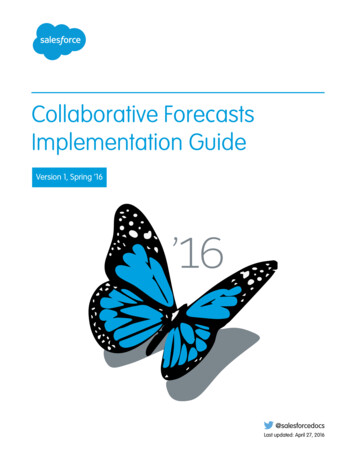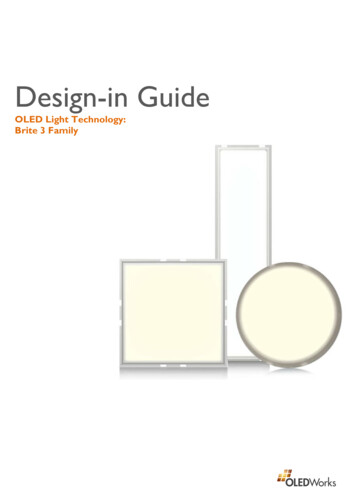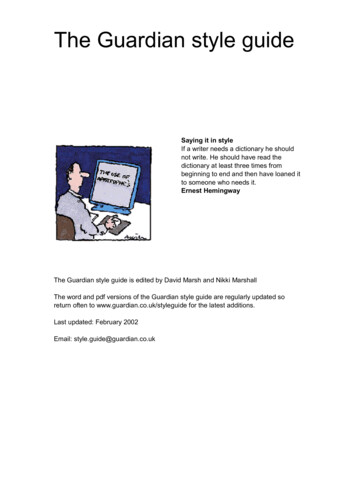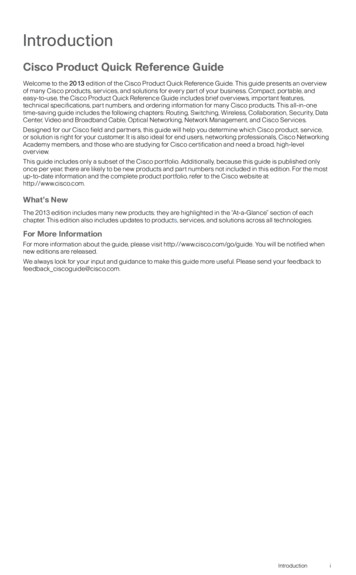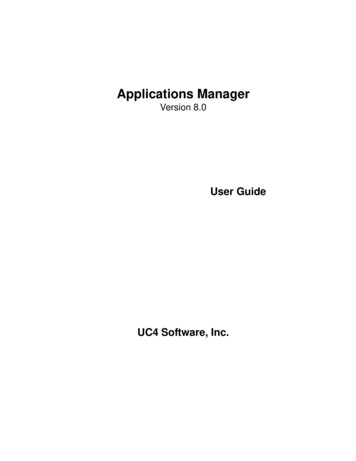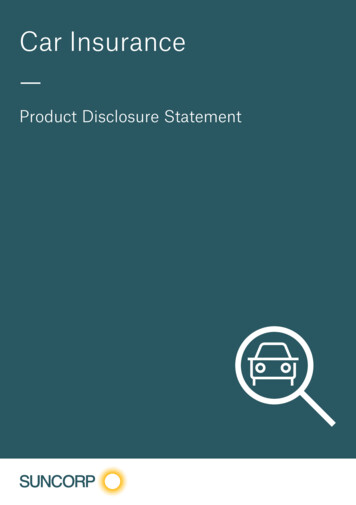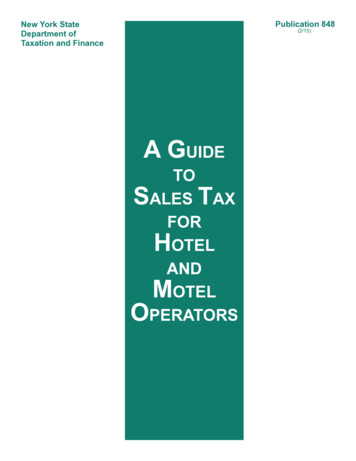
Transcription
Publication 848New York StateDepartment ofTaxation and Finance(2/15)A GUIDETOSALES TAXFORHOTELANDMOTELOPERATORS
Publication 848 (2/15)About this publicationPublication 848 is a guide to New York State and local sales and use taxes administered by the Tax Departmentas they apply to you in your operation of a hotel, motel or similar establishment. It is intended to provide you,the owner, operator, or manager (collectively to be referred to in this publication as operator or operator of ahotel) with information related to sales tax that is specific to the hotel and motel industry, and to help youunderstand your sales tax responsibilities. Any reference to sales tax in this publication includes, whereappropriate, both the state and local sales and use taxes administered by the Tax Department. Under theTax Law, a person required to collect tax includes every operator of a hotel and every vendor of taxabletangible personal property or services. Therefore, it is important that you know the taxable status of the rental ofrooms, and sales of related tangible personal property and services, including sales of food and drink.This publication provides you with detailed information on the imposition of sales tax on hotel occupancy, thesales tax treatment of the varied transactions that you may be involved in, the permanent resident exclusion, andinformation on your responsibility when a customer claims an exemption from sales tax. It also includesinformation on capital improvements to, and the repair and maintenance of hotel/motel premises.This publication does not address any of the locally-imposed taxes on hotel occupancy administered by countiesand cities (bed taxes), except where these taxes are referenced to illustrate how to properly compute sales tax.For information about local occupancy taxes, please contact the taxing jurisdiction in which the hotel is located.For additional and more general information on sales tax, please see Publication 750, A Guide to Sales Tax inNew York State, Tax Bulletin Hotel and Motel Occupancy (TB-ST-331), Tax Bulletin Hotel Services(TB-ST-333), Tax Bulletin Food and Beverages Sold from Vending Machines (TB-ST-280), Tax Bulletin Salesby Restaurants, Taverns, and Similar Establishments (TB-ST-806), and Tax Bulletin Caterers and CateringServices (TB-ST-110). You can obtain Publication 750, other Tax Department publications, memoranda(TSB-Ms), Tax Bulletins and other tax guidance documents from the Department’s Web site at www.tax.ny.govor by calling (518) 457-5431.If you have any questions regarding any aspect of the sales tax or other taxes administered by the TaxDepartment, please contact us. See Need help? on the back cover of this publication.NOTE: A publication is an informational document that addresses a particular topic of interest totaxpayers. Subsequent changes to the law or regulations, judicial decisions, Tax AppealsTribunal decisions, or changes in Department policies could affect the validity of theinformation presented in this publication. Publications are updated regularly and are accurateon the date issued.3
Publication 848 (2/15)4
Publication 848 (2/15)Table of contentsPageImposition of sales tax on rent for hotel occupancy. .7Definitions.8Computation of tax on rent for hotel occupancy. .11Permanent resident exclusion. .14Exempt occupants. .18Hotels operated by section 1116(a)(4) exempt organizations.22Hotels operated by colleges and universities. .22Nontaxable occupancies.23Employee meals and lodging. .24Hotels operating on the American Plan. .25Rental of meeting rooms or similar accommodations. .26Miscellaneous transactions. .27Leasing of space in hotel buildings and related transactions. .30Capital improvements and repair and maintenance expenses.31Purchases by hotel operators.34Chart of Transactions Relating to the Operation of a Hotel. .375
Publication 848 (2/15)6
Publication 848 (2/15)Imposition of sales tax on rent for hotel occupancySales tax is imposedon the rent foroccupancy of a roomor rooms in a hotelSales tax is imposed on the rent for every occupancy of a room or rooms in ahotel in New York State. (See page 9 for the definition of hotel occupancy).However, the sales tax on the rent for hotel occupancy is not imposed (1) ona permanent resident of the hotel; (2) where the rent is not more than 2 perday; or (3) on rent for any occupancy that is excluded or exempted from taxunder the Tax Law or under any other provision of law. (See page 14 fordetailed information on the permanent resident exclusion and see page 18 forinformation on exempt occupants). Also, the sales tax on the rent for hoteloccupancy is not imposed on the rent of a room that meets the definition ofplace of assembly and that is used for one or more of the purposes describedin the definition. (See page 10 for the definition of place of assembly andpage 26 for information on the rental of meeting rooms in combination withthe serving of food or drink or catering services.)Hotel unit feeimposed inNew York CityIn addition to the sales tax on hotel occupancy and any local occupancytaxes, a hotel unit fee in the amount of 1.50 per unit per day (hereinafter theNYC 1.50 fee) is imposed on every occupancy of a unit in a hotel locatedwithin New York City (Bronx, Kings, New York, Queens and RichmondCounties). Like the sales tax on rent for hotel occupancy, this hotel unit feeis not imposed (1) on a permanent resident of the hotel; (2) where the rentper unit is not more than 2 per day; or (3) on rent for any occupancy that isexcluded or exempted from sales tax under the Tax Law or under any otherprovision of law. The NYC 1.50 fee is administered and collected in thesame manner as the sales tax on the rent received for hotel occupancy. Foradditional information on this hotel unit fee, including the definition of unitin a hotel, please see TSB-M-05(2)S, Fee on Hotel Occupancy in New YorkCity.Operators of hotelsare required tocollect and pay overthe sales taxAs an operator of a hotel, you are a person required to collect tax and payover any tax due to the Tax Department.Local occupancytaxesIn addition to the sales tax on rent for occupancy and the hotel unit feeimposed in New York City, certain jurisdictions also impose and administerlocal occupancy taxes on hotel occupancy, commonly known as a bed tax.Any questions regarding a local occupancy tax should be directed to thetaxing jurisdiction in which the hotel is located.7
Publication 848 (2/15)DefinitionsHotelA hotel is a building or a portion of a building which is regularly used andkept open for the lodging of guests. A building comes within the definitionof a hotel if, among other factors: sleeping accommodations are provided for the lodging of payingoccupants on a regular basis; the typical occupant is a transient or public traveler; the relationship between the operator of the establishment and theoccupant of the accommodations is that of an innkeeper and guest andnot of a landlord and tenant; the occupant does not have an exclusive right or privilege with respectto any particular room or rooms, but instead merely has an agreementfor the use or possession of a particular room or rooms; and the operator provides maid and linen service or other customary hotelservices for its occupants.The term hotel includes the following: apartment hotels; motels; hostels; tourist cabins; bungalows (however, see page 24 for information regarding thenontaxable rental of bungalows); cottage colonies; inns; boarding houses or clubs; lodging houses; rooming houses; bed and breakfasts; guest houses; dude ranches; ski lodges; and similar establishments that are regularly used and kept open for thelodging of occupants.Note: If a person rents a room in his or her residence to a transient occupanton a less-than-regular basis, the room being rented out is not considered aroom in a hotel, and, therefore, the person is not required to collect sales taxon the rental.8
Publication 848 (2/15)Operator of a hotelOperator of a hotel is any person operating a hotel. A person operating ahotel includes a room remarketer as defined below. A room remarketer isdeemed to operate a hotel, or a portion thereof, with respect to which theroom remarketer has the rights of a room remarketer in the next paragraph.Room remarketerA room remarketer is a person who reserves, arranges for, conveys, orfurnishes occupancy, whether directly or indirectly, to an occupant for rentin an amount determined by the room remarketer, directly or indirectly,whether pursuant to a written or other agreement. A room remarketer’sability or authority to reserve, arrange for, convey or furnish hoteloccupancy, directly or indirectly, and to determine rent therefore, arereferred to as rights of a room remarketer. A room remarketer is not apermanent resident with respect to a room for which the person has therights of a room remarketer.Because a room remarketer, whether Web based or not, is an operator of ahotel, the full amount that a room remarketer charges to its customer for theright to occupy a room in a hotel in New York State constitutes taxable rentfor hotel occupancy.Subject to certain conditions and limitations, a room remarketer is allowed arefund or credit against the amount of tax required to be collected andremitted in the amount of state and local sales tax on rent for hoteloccupancy, and, where applicable, the NYC 1.50 fee, paid to the operatorof a hotel by a room remarketer.For more information on room remarketers, see TSB-M-10(10)S,Amendments Affecting the Application of Sales Tax to Rent Received forHotel Occupancy by Room Remarketers, and TSB-M-12(8)S, 2012 BudgetLegislation Affecting the Sales Tax Obligations of Room Remarketers.Note: Businesses such as travel agencies, that reserve rooms on behalf oftheir customers but do not have the right to determine the amount of rent thattheir customers pay for the room (i.e., the rent is fixed and determined by thehotel and is not allowed to be marked up by the business that reserves theroom on behalf of its customers) are not room remarketers.Hotel occupancyHotel occupancy is the use or possession, or the right to the use orpossession, of any room or rooms in a hotel. The right to use or possession,of any room or rooms in a hotel includes the rights of a room remarketer. Asexplained below, room or rooms in a hotel does not include a place ofassembly.Hotel occupantA hotel occupant is a person who, for a consideration, uses, possesses or hasthe right to use or possess any room in a hotel under any lease, concession,permit, right to access, license to use, or other agreement. The right to use orpossess a room includes the rights of a room remarketer.9
Publication 848 (2/15)Room or rooms in ahotelRoom or rooms in a hotel means any room or rooms of any kind in any partor portion of a hotel that are available to be rented or are rented for anypurpose other than as a place of assembly. (See the definition of place ofassembly below.) Room or rooms in a hotel include dormitory-type sleepingfacilities at ski lodges, dude ranches and similar establishments.Place of assemblyPlace of assembly means a room or suite of rooms containing no sleepingaccommodations and intended to be used for purposes other than sleepingand living accommodations such as, meetings, recreation, education,business or religious purposes.PersonThe term person includes an individual, partnership, limited liabilitycompany, society, association, joint stock company, corporation, estate,receiver, trustee, assignee, referee, and any other person acting in a fiduciaryor representative capacity, whether appointed by a court or otherwise, andany combination of the foregoing.Rent for hoteloccupancyRent for hotel occupancy is the consideration for occupancy of a room orrooms in a hotel, including any service or other charge or amount required tobe paid as a condition of occupancy, valued in money or otherwise, whetherreceived by the operator or by a room remarketer or by another person onbehalf of either the operator or room remarketer.Rent for hotel occupancy also includes charges for accommodations,services, facilities, amenities and items that are incidental to the occupancyof the room or rooms, whether those charges are separately stated orincluded as one sum in the daily rate for the room or rooms. Examplesinclude charges for: maid service; concierge service; towel and linen service; local telephone service not billed on a per call basis; in room computer; in room modem lines; and providing additional beds, cots or other furnishings for occupants.Example: Upon completion of a two-day stay at a hotel, an individual ispresented with an itemized bill showing the following charges:Rental of roomLocal telephone serviceMaid serviceLinen and towel serviceTotal 500.0017.2850.0025.00 592.28Rent for hotel occupancy is the entire charge of 592.28, whichcomprises the base amount of rent for the room plus the incidental10
Publication 848 (2/15)charges for local telephone service, maid service, and linen and towelservice.Reasonable and separately stated charges for any service or other charge oramount not required to be paid as a condition for occupancy of a room orrooms in a hotel are not considered to be rent. For example, reasonable andseparately stated charges for food and drink, entertainment, valet andlaundry service, theater ticket service, parking or transportation service donot constitute rent, but may be taxable under other sections of the Tax Law.Please see page 27 for further information on this topic.Computation of tax on rent for hotel occupancyDetermining the rateof sales tax on therent for hoteloccupancyThe amount of sales tax due on rent for hotel occupancy is computed byapplying the combined state and local sales tax rate, including, whereapplicable, the 3/8 % sales tax imposed in the Metropolitan CommuterTransportation District (MCTD), to the amount of rent charged for the roomor rooms. The MCTD comprises the counties of Dutchess, Nassau, Orange,Putnam, Rockland, Suffolk and Westchester, and the city of New York(Bronx, Kings, New York, Queens, and Richmond counties). The NYC 1.50 fee imposed in New York City and discussed on page 7 is not includedin the amount upon which sales tax is computed.The amount of anylocal occupancy taxis not included in thecomputation of thesales tax due on therent of hotel roomsIf the rent for the occupancy of a hotel room or rooms in a local jurisdictionis also subject to the local occupancy (bed) tax, the amount of the localoccupancy (bed) tax is not included in the computation of the sales tax.Example: An individual rents a room at a bed and breakfast for twodays. The bed and breakfast is located outside the MCTD but in ajurisdiction that imposes a 3% local occupancy (bed) tax. The rental rateper day is 100. Assuming a combined rate of state and local sales tax of8% in the jurisdiction, the total due for occupancy of the hotel room iscomputed as follows:Rental charge (2 days @ 100 per day)Local occupancy tax (3% x 200)Sales tax (8% x 200)Total dueChange in tax rate 200.006.0016.00 222.00If there is a change in the sales tax rate, you must collect tax on rent for hoteloccupancy at the new rate beginning on the first date of occupancy thatoccurs on or after the effective date of the rate change. For updated state andlocal sales tax rates, see Publication 718, New York State Sales and Use TaxRates by Jurisdiction, or our Web site.Example: An individual rents a hotel room for seven days at the rate of 60 per night in a taxing jurisdiction outside the MCTD. An increase inthe local sales tax rate takes effect on the fourth day of the individual’s11
Publication 848 (2/15)occupancy. The combined tax rate was 7% prior to the increase in thelocal sales tax rate and is 8% after the increase. The tax due on therental of the room is computed as follows:Rental charge (3 days @ 60 per day)Sales tax (7% x 180.00)Rental charge (4 days @ 60 per day)Sales tax (8% x 240)Total due 180.0012.60240.0019.00 451.60Credit card chargesWhen an occupant uses a credit card to pay his or her bill, the credit cardcompany may deduct administrative charges and pay the hotel an amountwhich represents less than 100% of the occupant’s bill. The deduction of theadministrative charges by the credit card company does not affect theamount subject to sales tax, or the amount of sales tax due and collectible onthe bill.Gift certificatesGift certificates for a stated dollar amount, whether given away for noconsideration or sold, are not subject to sales tax. The gift certificate is theequivalent of money or other consideration that may be used to pay for anitem in a transaction. When the gift certificate is used, sales tax is due onthose charges that are normally subject to sales tax. The occupant may paythe sales tax either from the proceeds of the gift certificate, with cash or withsome other consideration.CouponsUnlike a gift certificate, a coupon represents a reduction in the price offeredby either the hotel operator or a third party. If a hotel accepts a coupon thatoffers an occupant a discount and the hotel will not be reimbursed by a thirdparty for any part of the value of the coupon discount then sales tax iscomputed based on the discounted charge to the occupant.However, if the hotel is reimbursed by the coupon issuer or any other personfor all or any part of the coupon value, the amount of the reimbursement isincluded in the amount of rent subject to sales tax.Example: As a promotion for its grand opening, a hotel issues couponsentitling occupants to a 15% discount on the rental of a suite. The hotelwill not receive any reimbursement for the discounts. An occupant rentsa suite of rooms for one day. The rental charge for the suite is usually 650. The occupant uses a coupon issued by the hotel, and pays a netrental charge of 552.50. Sales tax is due on 552.50.Example: A hotel chain franchisor offers a 20% discount to corporateoccupants who rent a room in one of the hotels operated by a franchisee.The incentive is advertised in the newspapers along with a coupon forthe occupant to use in order to
hotel in New York State. (See page 9 for the definition of hotel occupancy). However, the sales tax on the rent for hotel occupancy is not imposed (1) on a permanent resident of the hotel; (2) where the rent is not more than 2 per day; or (3) on ren
